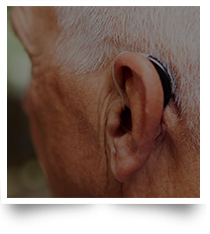Ear Services

Tinnitus
Tinnitus is the phenomenon when a person perceives a sound in their ear that is not generated by an outside source. Patients often describe this sound as:
- Ringing
- Buzzing
- Roaring
- Humming
- Swooshing or hissing
According to the American Tinnitus Association, approximately 50 million people in America suffer from tinnitus. Tinnitus is not an actual condition; rather it is a symptom of a condition. Such conditions may include, but are not limited to, hearing loss from noise exposure, hearing loss related to age, inner ear disorders, auditory nerve growths, and head injuries. Additionally, some medications may list tinnitus as a side effect.
Tinnitus can present itself in both ear, one ear only, or in one ear more than the other. It can even sound different in each ear. Sufferers of tinnitus may find that there are certain triggers that cause their tinnitus to be more debilitating, such as:
- Caffeine
- Stress
- Loud music
- Certain foods
Managing these triggers may offer some relief.
There is no known research-based cure for tinnitus; however, there is still hope. At The Hearing Center at Rocky Mountain ENT, an audiologist can work with you to assess the impact of tinnitus on your life. There are multiple therapy options that have been proven to reduce tinnitus. Your audiologist can prescribe an appropriate option for you. It is extremely important to be evaluated if you notice any change in the status of your tinnitus or if you have it in only one ear. If you are concerned about your tinnitus, feeling as if it is negatively impacting your ability to enjoy life, or just want to know more information, schedule and appointment to see us today!
Pediatric Otolaryngology
Pediatric ear surgery can range from the simple placement of pressure equalizing tubes in the eardrum to compensate for dysfunction of the Eustachian tube, to cochlear implants for deafness. Most common are tube surgeries, performed when conservative management such as antibiotics and allergy treatment are unsuccessful. More complex surgeries include tympanic membrane reconstruction, surgery for cholesteatoma, and reconstruction of the ear canal. We take great care in trying to determine the underlying cause for the ear infections, and have significant experience working with children in a sometimes stressful situation.
Hearing & Hearing Loss
Hearing loss is the sudden or gradual decrease in how well you can hear sounds. Most commonly caused by age, hearing loss is a common condition that affects up to 25% of people between the ages of 65 and 75, and up to 75% of people over the age of 75. Hearing loss can be mild or severe and can be reversible, temporary or permanent.
There are two main types of hearing loss, conductive, and sensorineural. Conductive loss implies a problem with either the ear drum or 3 bones of hearing (malleus, incus, and stapes.) It is frequently correctible surgically. Sensorineural hearing loss implies a problem with the cochlea or nerve of hearing. Frequently it can be helped with a hearing aid, medical treatment, or in extreme circumstances, cochlear implantation.
Cochlear Implants
A cochlear implant is an electrode device that is surgically placed in the skull and the inner ear (cochlea). This device is implanted by an ear, nose, and throat doctor with a subspecialty in neuro-otology. An ear level processor is worn, similar to a hearing aid, which allows for the processing of sound to be converted to the electrode implanted underneath the skin.
A cochlear implant is intended for use with patients who no longer receive benefit from their hearing aids or for children who are born deaf. At The Hearing Center at Rocky Mountain ENT, you will work closely with your audiologist and ENT to determine if you are a candidate for a cochlear implant and surgery. Our team has been successfully implanting and programming cochlear implants since 1996. Once the surgery is complete, you will spend a lot of one-on-one time with your audiologist to program and fine-tune the cochlear implant.
Cochlear implants will not restore hearing to “perfect”; however, cochlear implants can greatly help children succeed in school and give adults access to speech and sounds they otherwise were not able to hear. There are many considerations to discuss with both the surgeon and audiologist, and if you are ready to explore this wonderful step into the world of hearing, we encourage you to schedule your consultation today!
Cochlear Implants
Cochlear
Advanced Bionics
Medel
Bone Anchored Hearing Aids
Bone anchored hearing aids are implantable devices used for individuals with a conductive hearing loss for whom middle ear reconstruction is not feasible, or those who have unilateral deafness. The surgery is relatively simple, performed in either one or two stages depending on age, and takes advantage of the ability of the skull to relay sound to the inner ear from a hearing aid that snaps to a small post implanted in the skull.
After meeting with our Audiologists and determining that a traditional hearing aid is not the right choice, you will have a consultation one of our surgeons. Please contact us today to find out which hearing solution is best for you.






